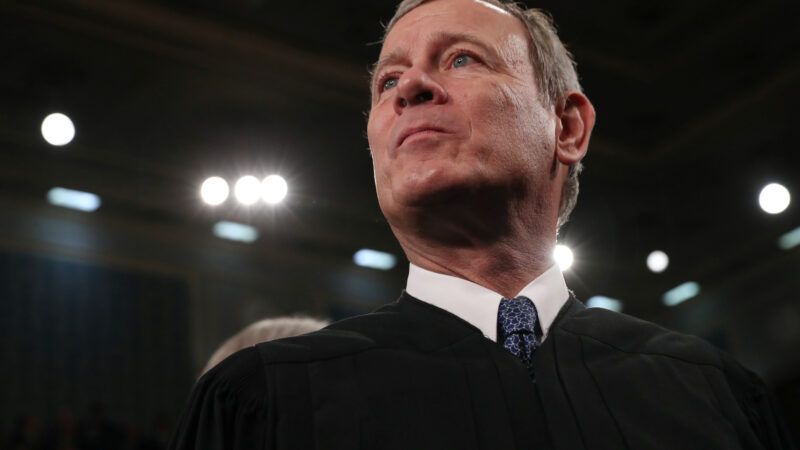The Trouble With John Roberts' Brand of Legal Conservatism
Is the chief justice just a politician in robes?

Writing in The Washington Post, law professor Adrian Vermeule and historian Varad Mehta lambast Chief Justice John Roberts, claiming his "apostasies have demoralized the right" and "emboldened the left." As they see it, Roberts "has engaged in strategic maneuvering," casting his lot with the U.S. Supreme Court's Democratic appointees in certain high-profile cases solely in order to protect the Court's reputation. "His goal appears to be to preserve what he takes to be the legitimacy of the Supreme Court, by disproving any suspicion that the justices vote ideologically or otherwise engage in political behavior." The chief justice is guilty of unprincipled judging, they assert, and his shenanigans are doing damage to the Court's legitimacy.
It has certainly become commonplace to think of Roberts as a sort of politician in robes, sticking his finger in the air to see which way the political winds blow. The problem with that way of thinking is that it misses something crucial about Roberts and his judicial handiwork. Namely, Roberts does have an underlying judicial philosophy that motivates him in many of these big cases; it just happens that this philosophy has rapidly fallen out of favor among many of his fellow conservatives.
I am referring to the philosophy of judicial deference or restraint, which, in a nutshell, is the idea that people should take their complaints to the ballot box, not to the courthouse. This view once occupied the commanding heights of the American conservative movement, exemplified most famously by the writings of the late conservative legal icon Robert Bork. "In wide areas of life," Bork argued, "majorities are entitled to rule, if they wish, simply because they are majorities." That meant that the courts should butt out.
Bork did not invent this view. Rather, he inherited it from certain towering legal figures from the early 20th century. The most influential of them was Supreme Court Justice Oliver Wendell Holmes Jr., who repeatedly preached "the right of a majority to embody their opinions in law."
That deferential view is not as popular among conservatives today as it once was. But Roberts can still be seen carrying the Holmes/Bork torch.
During his 2005 Senate confirmation hearings, for instance, Roberts tried to put a positive spin on Kelo v. City of New London, a recently decided case that left many conservatives fuming, angry that the Court had shortchanged property rights in favor of a controversial eminent domain scheme. Roberts offered a different view. The Court's ruling "leaves the ball in the court of the legislature," he said, "and I think it's reflective of what is often the case and people sometimes lose sight of, that this body [Congress] and legislative bodies in the States are protectors of people's rights as well." (Take your complaint to the ballot box, not to the courthouse.)
And then there is National Federation of Independent Business v. Sebelius (2012), which is perhaps Roberts' most famous legal judgment. At issue was the survival of the Patient Protection and Affordable Care Act, also known as Obamacare.
Roberts saved the law from destruction. Why did he do it? In their piece for The Washington Post, Vermeule and Mehta cite the Obamacare case as "an early, important example" of Roberts' "dismaying trend of tactical decisions." He upheld President Barack Obama's signature law, in their view, in order to save the Court from scorching liberal criticism.
But Vermeule and Mehta's take misses what actually happened in Roberts' Obamacare ruling. Not only did Roberts' borrow a page from the Holmes/Bork playbook, but he specifically invoked one of Holmes' most notable statements about the proper role of the courts. "If my fellow citizens want to go to Hell I will help them," Holmes wrote in 1920. "It's my job." Here is how Roberts put it in 2012: "It is not our job to protect the people from the consequences of their political choices."
Whether or not you agree with the chief justice's embrace of judicial deference, it would be a mistake to downplay this important facet of his thinking.
